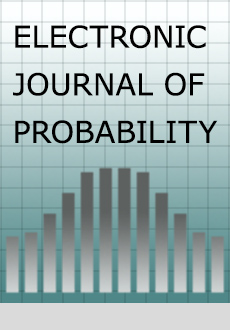Abstract
Shnerb et al. (2000), (2001) studied the following system of interacting particles on $\Bbb Z^d$: There are two kinds of particles, called $A$-particles and $B$-particles. The $A$-particles perform continuous time simple random walks, independently of each other. The jumprate of each $A$-particle is $D_A$. The $B$-particles perform continuous time simple random walks with jumprate $D_B$, but in addition they die at rate $\delta$ and a $B$-particle at $x$ at time $s$ splits into two particles at $x$ during the next $ds$ time units with a probability $\beta N_A(x,s)ds +o(ds)$, where $N_A(x,s)\; (N_B(x,s))$ denotes the number of $A$-particles (respectively $B$-particles) at $x$ at time $s$. Conditionally on the $A$-system, the jumps, deaths and splittings of different $B$-particles are independent. Thus the $B$-particles perform a branching random walk, but with a birth rate of new particles which is proportional to the number of $A$-particles which coincide with the appropriate $B$-particles. One starts the process with all the $N_A(x,0),\, x \in \Bbb Z^d$, as independent Poisson variables with mean $\mu_A$, and the $N_B(x,0),\, x \in \Bbb Z^d$, independent of the $A$-system, translation invariant and with mean $\mu_B$.
Shnerb et al. (2000) made the interesting discovery that in dimension 1 and 2 the expectation $\Bbb E\{N_B(x,t)\}$ tends to infinity, no matter what the values of $\delta, \beta, D_A$, $D_B, \mu_A,\mu_B \in (0, \infty)$ are. We shall show here that nevertheless there is a phase transition in all dimensions, that is, the system becomes (locally) extinct for large $\delta$ but it survives for $\beta$ large and $\delta$ small.
Citation
Harry Kesten. Vladas Sidoravicius. "Branching Random Walk with Catalysts." Electron. J. Probab. 8 1 - 51, 2003. https://doi.org/10.1214/EJP.v8-127
Information





